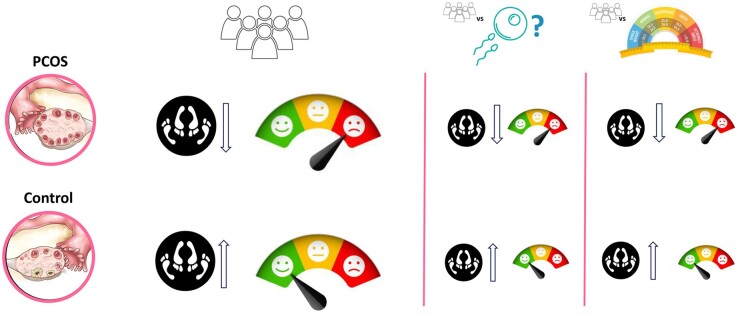Understanding Polycystic Ovary Syndrome (PCOS)
Polycystic Ovary Syndrome (PCOS) is a prevalent endocrine disorder affecting approximately 10% of women of reproductive age. Characterized by hormonal imbalances, it often leads to irregular menstrual cycles, infertility, and metabolic complications such as diabetes and cardiovascular disease. PCOS is also associated with psychological concerns, including depression and anxiety, which can further compound its impact on quality of life. Among the myriad challenges faced by women with PCOS, sexual function is a significant yet often overlooked aspect.
The Importance of Sexual Function in PCOS
Sexual function is a crucial component of overall well-being and quality of life. For women with PCOS, the interplay between hormonal changes, physical symptoms (such as excess body hair), and psychological factors can influence sexual health. Understanding how PCOS affects sexual function is vital for providing comprehensive care and support to affected individuals.
Objective and Rationale of the Study
A recent systematic review aimed to evaluate sexual function in women with PCOS by synthesizing findings from existing research. The study sought to assess the quality of research and certainty of outcomes to inform the 2023 International Guidelines for the Assessment and Management of PCOS. By doing so, the study hoped to shed light on this critical aspect of PCOS and guide future research directions.
Methodology: A Comprehensive Review
To achieve its objectives, the review meticulously searched eight electronic databases until June 2023. It included studies that assessed sexual function in women with PCOS using validated sexuality questionnaires or visual analogue scales (VAS). The data were analyzed using random-effects models to compare sexual function between women with PCOS and non-PCOS groups, employing Hedges’ g as the standardized mean difference.
Key Findings: Impaired Sexual Function in Women with PCOS
The review included 32 articles, revealing significant findings regarding sexual function in women with PCOS. Pooled Female Sexual Function Index (FSFI) scores indicated worse sexual function across most subdomains, including arousal, lubrication, orgasm, and pain. Additionally, overall sexual function and satisfaction scores were lower in women with PCOS compared to controls.
The meta-analysis of VAS studies highlighted the negative impact of excess body hair on sexual attractiveness and satisfaction, although no differences were found in the perceived importance of a satisfying sex life. Interestingly, none of the studies assessed sexual distress, a critical component necessary to diagnose psychosexual dysfunction.
Figure:Women with PCOS report lower sexual function and lower sexual satisfaction compared to control women, both overall and in subgroups based on fertility status and body mass index.
Implications for Health Care Professionals
The findings underscore the need for health care professionals to address sexual function and distress when treating women with PCOS. Understanding the multifactorial influences on sexual health can enable clinicians to provide more holistic care. Discussions about sexual health should be integrated into routine consultations, offering a safe space for patients to express concerns and seek support.
Future Directions: Bridging the Research Gap
Despite the insights gained, the review highlighted several gaps in existing research. There is a pressing need to explore sexual distress scores to fully understand psychosexual dysfunction in PCOS. Future studies should also strive to include more diverse populations, encompassing various sexual orientations and ethnic backgrounds. Additionally, research should assess the efficacy of treatments for sexual dysfunction, considering both lifestyle and pharmacological interventions.
Case Vignette: Emily’s Journey with PCOS
Meet Emily, a 29-year-old marketing professional diagnosed with PCOS at the age of 24. Despite leading a healthy lifestyle, Emily has struggled with irregular menstrual cycles and persistent acne. Recently, she noticed changes in her sexual health, including decreased libido and discomfort during intimacy. Emily’s experience highlights the importance of comprehensive care that addresses both physical and emotional aspects of PCOS.
During a routine check-up, Emily’s doctor initiated a conversation about sexual health, providing valuable insights and support. Emily was encouraged to explore lifestyle modifications and consult a specialist to address her concerns, underscoring the importance of open communication and tailored interventions.
Conclusion: Towards Better Understanding and Care
As the research on sexual function in women with PCOS evolves, it is crucial to approach this topic with sensitivity and understanding. By fostering open dialogues and encouraging comprehensive research, health care professionals can help women like Emily navigate the complexities of PCOS and achieve better quality of life. Ultimately, a holistic approach that considers sexual health as a key component of care can make a significant difference in the lives of those affected by PCOS.
Reference
Pastoor H, Mousa A, Bolt H, Bramer W, Burgert TS, Dokras A, Tay CT, Teede HJ, Laven J. Sexual function in women with polycystic ovary syndrome: a systematic review and meta-analysis. Hum Reprod Update. 2024 May 2;30(3):323-340. doi: 10.1093/humupd/dmad034 IF: 16.1 Q1





Hey I know this is off topic but I was wondering iif you knew of any widgets I could add to my blog that automatically tweet my nwest twitter updates.
I’ve been looking for a plug-in like this for quite some time and was hoping maybe you would have somee experience
with something like this. Please let me know if you run into anything.
Nice